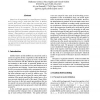2047 search results - page 98 / 410 » The limits of speech recognition |
ICPR
2000
IEEE
14 years 10 months ago
2000
IEEE
Speech can be represented as a time/frequency distribution of energy using a multi-band filter bank. A Markov random field model, which takes into account the possible time asynch...
INTERSPEECH
2010
13 years 3 months ago
2010
This paper presents an improved wavelet-based dereverberation method for automatic speech recognition (ASR). Dereverberation is based on filtering reverberant wavelet coefficients...
ICASSP
2011
IEEE
13 years 16 days ago
2011
IEEE
In current speech recognition systems mainly Short-Time Fourier Transform based features like MFCC are applied. Dropping the short-time stationarity assumption of the voiced speec...
ICASSP
2009
IEEE
14 years 3 months ago
2009
IEEE
Model compensation is a standard way of improving the robustness of speech recognition systems to noise. A number of popular schemes are based on vector Taylor series (vts) compen...
TSD
2010
Springer
13 years 6 months ago
2010
Springer
The question how to integrate information from different sources in speech decoding is still only partially solved (layered architecture versus integrated search). We investigate t...

